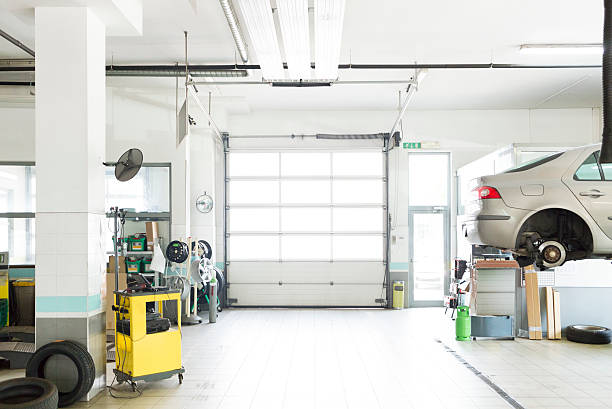For every car owner, maintaining the safety, dependability, and performance of their vehicle is crucial. Automotive brakes and oil changes are two essential parts of car maintenance that are very important in this sense. In addition to ensuring that your car operates well, regular maintenance on these parts also increases your safety while driving. We will examine the world of automotive Brakes and oil change services in this thorough guide, explaining their significance, how they operate, and why they ought to be a regular part of your car maintenance schedule.
The Importance of Automotive Brakes
Your Vehicle’s Lifesavers
Automotive brakes are an essential safety component of your car, not just a convenience. A sophisticated system is activated when you depress the brake pedal, converting kinetic energy into heat and eventually causing your car to slow down or stop. This procedure is essential to averting mishaps and guaranteeing your security while driving.
Regular Inspection and Maintenance
To ensure the effectiveness of your vehicle’s braking system, regular inspection and maintenance are imperative. Here are some key components of automotive brake maintenance:
Brake Pads and Shoes: These components make contact with the brake rotors or drums, creating friction to slow down your vehicle. Over time, they wear out and should be replaced when they reach a certain thickness.
Brake Fluid: Brake fluid plays a critical role in transferring the force applied to the brake pedal to the brake components. It can absorb moisture over time, affecting its performance. Regular flushing and replacement are necessary to maintain optimal brake function.
Rotors and Drums: These are the flat surfaces that the brake pads or shoes make contact with. They should be inspected for wear, warping, or damage.
Brake Lines and Hoses: Any signs of leakage or damage to these components should be addressed immediately.
Regular Brake maintenance not only ensures your safety but also extends the lifespan of your braking system, saving you money in the long run.
Early Warning Signs
Understanding the early warning signs of brake problems is crucial. If you experience any of the following symptoms, it’s time to have your brakes inspected:
Squeaking or squealing noises when braking
Reduced brake responsiveness or increased pedal travel
Vibrations or pulsations in the brake pedal
A soft or spongy brake pedal
Illuminated brake warning light on your dashboard
Ignoring these signs can lead to more significant and costly issues down the line. The moment you notice any of these symptoms, it’s time to visit a trusted service center for a thorough brake inspection.
The Significance of Oil Changes
Lubrication and Engine Health
It’s common to hear oil described as the engine’s lifeblood. It performs a number of vital tasks, such as cooling the engine, clearing debris, lubricating engine parts to minimize friction, and sealing piston rings to stop power loss. Over time, however, oil breaks down and becomes less effective at these tasks.
Regular Oil Changes
Regular oil changes are essential for maintaining engine health. Here are some reasons why oil changes should be part of your vehicle’s maintenance routine:
Engine Protection: Fresh oil provides better lubrication, reducing wear and tear on engine parts and extending the engine’s lifespan.
Fuel Efficiency: Old, dirty oil can cause the engine to work harder, reducing fuel efficiency. Regular oil changes can help you save money on gas.
Emissions Control: Clean oil helps your vehicle run cleaner, reducing harmful emissions and helping the environment.
Optimal Performance: With fresh oil, your engine runs more efficiently, providing better performance and a smoother driving experience.
Oil Change Intervals
The kind of oil you use, how you drive, and the manufacturer’s recommendations all affect how often you should change your oil. An oil change should be performed every 3,000 miles, according to conventional wisdom, but with the advent of synthetic oils and modern engines, this has been extended to 5,000–10,000 miles or more. To find the ideal schedule for your car, consult the owner’s manual or think about getting advice from a qualified mechanic.
Choosing the Right Oil
Selecting the right type of oil is crucial. There are three primary types:
Conventional Oil: This is the traditional oil made from crude oil. It offers good protection but requires more frequent changes.
Synthetic Oil: Made from chemically modified petroleum components, synthetic oil provides superior protection and maintains its properties over a longer period of time.
Synthetic Blend Oil: This oil combines conventional and synthetic oils, offering a balance between cost and performance.
Your vehicle’s requirements and your driving habits will influence your choice of oil. Always use the oil grade and type recommended by your vehicle’s manufacturer.
The Role of Professional Service Centers
Professional service centers are essential when it comes to car brakes and oil changes. These facilities employ highly qualified technicians with the training, tools, and experience necessary to carry out these crucial maintenance duties accurately. The following are some ways that reputable repair shops improve the performance and safety of your car:
Inspection and Diagnosis: Trained technicians can conduct thorough inspections to identify any issues with your brakes or engine that may require attention. Their expertise allows for early detection of potential problems, preventing costly breakdowns and accidents.
Quality Parts and Materials: Reputable service centers use high-quality parts and materials to ensure the longevity and effectiveness of your automotive brakes and engine. This quality extends the life of these components and ensures optimal performance.
Expertise and Experience: Skilled technicians possess extensive knowledge regarding the nuances of engines and brake systems. They can save you time and money by swiftly diagnosing problems and making the required corrections or adjustments.
Convenience: If you need auto maintenance, service centers provide the ease of a one-stop shop. They can easily help you stay on top of your car’s maintenance schedule by performing regular services like brake inspections, oil changes, and other maintenance-related tasks.
Warranty and Guarantee: Many professional service centers offer warranties and guarantees on their work. This provides peace of mind, knowing that you are protected in case of any issues that may arise after the service.
DIY vs. Professional Service
While some vehicle maintenance tasks can be handled by experienced DIY enthusiasts, automotive brakes and oil changes are best left to professionals. These tasks require specialized knowledge, tools, and equipment to ensure they are performed correctly and safely.
When it comes to your brakes, even a small mistake can have catastrophic consequences, affecting your safety and the safety of others on the road. Brake systems are complex and require precise adjustments and high-quality parts to function correctly.
Similarly, while changing your vehicle’s oil may seem straightforward, professional service centers offer distinct advantages. They have the ability to dispose of used oil and oil filters properly, reducing their environmental impact. Moreover, their expertise ensures that the oil change is done correctly, preventing issues like over-tightened oil filters or underfilled oil levels.
Maintaining Safety and Value
Oil changes and brake replacements are essential for the longevity and safety of your car, and they go beyond simple maintenance. Ignoring these areas can result in expensive repairs, decreased functionality, and potentially hazardous driving conditions. Follow a regular maintenance schedule that includes both brake inspections and oil changes to preserve the safety and value of your car.
By partnering with a professional service center, you can ensure that these essential maintenance tasks are performed with precision and expertise. With a commitment to regular automotive brake inspections and oil changes, you can enjoy a smooth, safe, and reliable driving experience while protecting your vehicle’s value for years to come.




